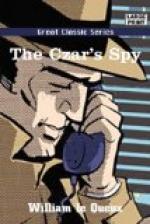But I turned upon my heel and went out, passing the sentries in the ante-room, along the flower-filled corridors and across the courtyard to the main entrance where the gorgeous concierge saluted me as I stepped forth into the square.
I had escaped by means of my own diplomacy and firmness. The Czar’s representative—the man who ruled that country—feared me, and for that reason did not hold me prisoner. Yet when I recalled that evil look of revenge on my departure, I could not help certain feelings of grave apprehension arising within me.
Returning to my hotel, I smoked a cigar in my room and pondered. Where was Elma? was the chief question which arose within my mind. By remaining in Helsingfors I could achieve nothing further, now that I had made the acquaintance of the oppressor, whereas if I returned to Abo I might perchance be able to obtain some clue to my love’s whereabouts. I call her my love because I both pitied and loved the poor afflicted girl who was so helpless and defenseless.
Therefore I took the midnight train back to Abo, arriving at the hotel next morning. After an hour’s rest I set out anxiously in search of Felix, the drosky-driver. I found him in his log-built house in the Ludno quarter, and when he asked me in I saw, from his face, that he had news to impart.
“Well?” I inquired. “And what of the lady? Has she been found?”
“Ah! your Excellency. It is a pity you were not here yesterday,” he said with a sigh.
“Why? Tell me quickly. What has happened?”
“I have been assisting the police as spy, Excellency, as I often do, and I have seen her.”
“Seen her! Where?” I cried in quick anxiety.
“Here, in Abo. She arrived yesterday morning from Tammerfors accompanied by an Englishman. She had changed her dress, and was all in black. They lunched together at the Restaurant du Nord opposite the landing stage, and an hour later left by steamer for Petersburg.”
“An Englishman!” I cried. “Did you not inform the Chief of Police, Boranski?”
“Yes, your Excellency. But he said that their passports being in order it was better to allow the lady to proceed. To delay her might mean her rearrest in Finland,” he added.
“Then their passports were vised here on embarking?” I exclaimed. “What was the name upon that of the Englishman?”
“I have it here written down, Excellency. I cannot pronounce your difficult English names.” And he produced a scrap of dirty paper whereon was written in a Russian hand the name—
“Martin Woodroffe.”
CHAPTER XIII
A DOUBLE GAME AND ITS CONSEQUENCES




